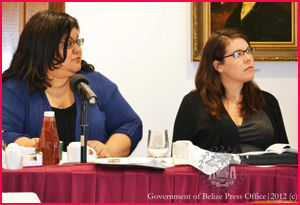 Hon. Dean Oliver Barrow, Prime Minister of Belize: “The government repeats, with no apology and indeed much pride, that our pro-poor programmes are the centerpiece of our social campaign, our mandate of egalitarianism.”
Hon. Dean Oliver Barrow, Prime Minister of Belize: “The government repeats, with no apology and indeed much pride, that our pro-poor programmes are the centerpiece of our social campaign, our mandate of egalitarianism.”
Prime Minister Barrow is one of many Heads of State that have based their public service career on pro-poor initiatives. He is also one of the few to put the money where his mouth and heart is. Judith Alpuche, Chief Executive Officer in Ministry of Human Development, Social Transformation and Poverty Alleviation, said, “when we came in 2008, the social assistance program was about half a million per year and now it’s at 5.2 million.” That $5.2 million dollars covers the Conditional Cash Transfer Programme, also known as Building Opportunities for Our Social Transformation initiative (BOOST). The World Bank praises Belize’s social protection programme, in particular the BOOST initiative, as the best in the hemisphere. Sara Berger, Social Protection Specialist from the World Bank, said, “Belize is far beyond many of the countries in Latin America in moving the dialogue from programmatic perspective to systematic perspective.”
BOOST has been effective because it provides financial support to the country’s most vulnerable population in an attempt to help them escape from what the World Bank refers to as “intergenerational transmission of poverty”. BOOST offers small cash assistance to poor and vulnerable households. A piece in the World Bank’s “News and Views” from June 28 of this year explained the program best: “The deal is simple: vaccinate your children, send them to school; and, if you are pregnant, visit your public health center, regularly starting with the first 12 weeks. In exchange, the BOOST Program will give you a monthly allowance between BZ$44 and BZ$82 (US$22 – US$41) per person, up to a maximum of six per household.” Since its inception in January 2011, more than 4,500 applicants for the program have been assessed and there are currently 3,224 households benefiting. Hon. Anthony Boots Martinez is extremely proud of the program’s early success. The Ministry points out that some of BOOST’s current features already match or surpass best practices in the world. Recorded school attendance for children included in the program was at 97.3% in May of this year and that number is expected to be just as strong by the end of the year.
Another feature of the program that have yielded results, just as impressive as the high school attendance record, is the financial independence initiative. The program also supports members in accessing financial services, such as savings and micro-loans as a first step towards their financial independence. Sara Berger said, “There is nothing comparable; 94% of the beneficiaries are receiving their transfers through credit unions. I have not seen this anywhere else in the world. In fact, the World bank is starting to talk about how do we use Belize as an example.”
In addition to the BOOST initiative, the Government also spends $2.5 million on the Food Pantry program. The program has been piloted in the Belize and Cayo Districts. The program allows low-income families to purchase a package of groceries at government subsidized cost. Upon introduction, a family was able to purchase a food package valued at $25 for only $12. That was adjusted as organizers found ways to cut down on waste and that increased the amount of goods received to a market price of $35. Government intends to expand this program to the benefit of more communities across the country.
The BOOST initiative and the Food Pantry program will be only two of the topics on the agenda during technical and policy workshops taking place this week between the World Bank and Ministry of Human Development, Social Transformation & Poverty Alleviation in collaboration with the Ministries of Health, Education, Youth & Sports, & Finance and Economic Development.




